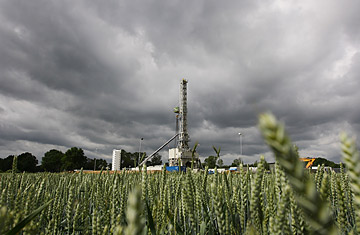
Diving Deep. An early shale-gas well in Poland
(2 of 3)
But just because the gas is there doesn't mean it will be tapped. The shale-gas push in the U.S. has been slowed by environmental concerns over fracking--chiefly the possibility of groundwater pollution--which will only intensify in politically greener and more crowded Europe. France and Bulgaria have already banned fracking for environmental reasons. Europe has 180 people per sq. mi. (70 people per sq km), more than twice the density of the U.S. Also, Europeans living above shale gas won't benefit as much from drilling as their American counterparts. In the U.S., people can own the mineral rights below their land, which means energy companies have to pay property owners to drill on their land to make up for the inconvenience. But in Europe the government controls the mineral rights even on private land, so property owners endure the pain of drilling without enjoying the profits.
In China there are other obstacles. Its shale gas is buried more deeply, making development more expensive. State-owned Chinese companies lack fracking expertise. And while the richest reserves are found in relatively unpopulated areas--a plus--those lands tends to lack the water and pipelines needed to frack. China's geology could prove more challenging as well if, as in Britain, concerns arise about earthquakes and other problems attributable to drilling. The independent British company Cuadrilla Resources began drilling wells in northwestern England but suspended operations last spring after two small earthquakes were detected near the sites. Cuadrilla later released a report that said fracking likely caused the quakes. British environmentalists are warning about the groundwater contamination allegedly caused by fracking in the U.S. And although the estimates of British shale-gas reserves are impressive, they are preliminary. No one will know how much gas is economically recoverable until companies start drilling.
Frack On
There are reasons for Europe and China to persist. Shale gas could allow former Soviet-bloc states like Poland, Romania and Ukraine, which are highly dependent on Russian natural gas, to break free of Moscow, which has used energy as a political weapon. In Poland, which has the largest reserves in Europe, the government has offered more than 100 shale-gas concessions to mostly foreign energy companies. Russia is clearly worried--so worried that its President, Vladimir Putin, has been singing environmentalists' tune about the dangers of fracking. "Poland wants to get rid of Russian gas," says Anne-Sophie Corbeau, the IEA's senior gas expert. "They're getting a lot more support from the population than you're seeing in other countries."
Authoritarian China doesn't need that popular support. To ramp up to 60 billion cubic meters of shale gas by 2020, from practically zero now, the government is encouraging state-owned oil companies to partner with experienced international players like Shell. "We completed 11 wells last year. We hope to effectively double that this year," Shell chief financial officer Simon Henry told reporters last month.
